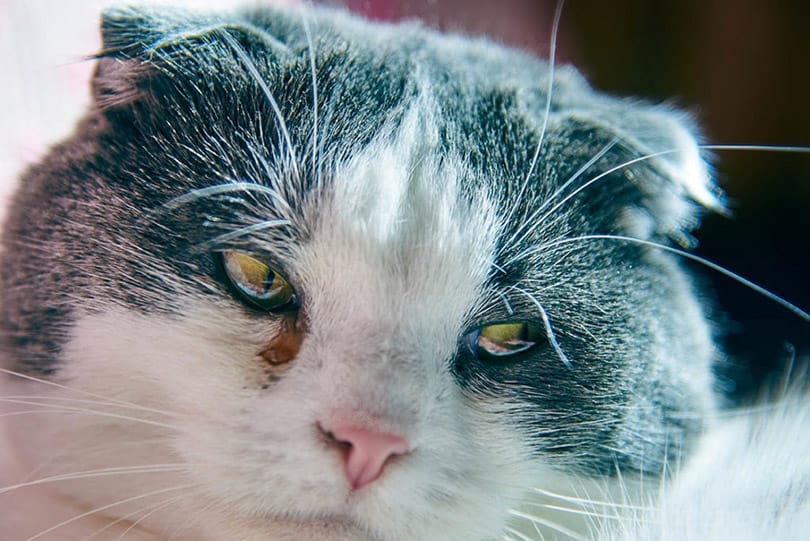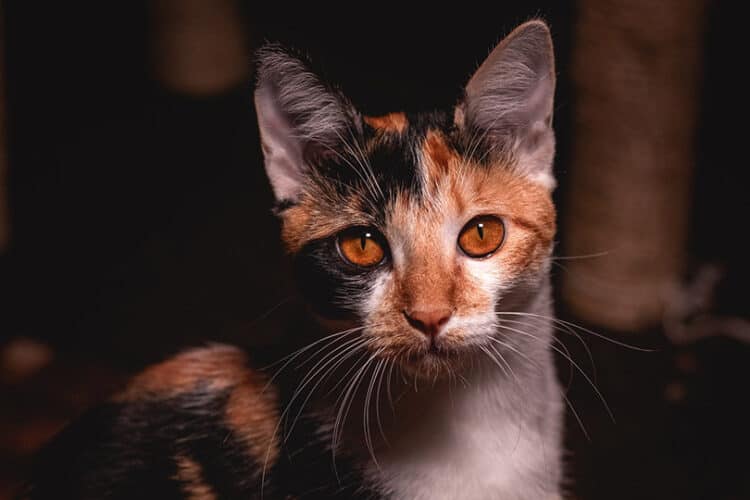When we hang out with our furry buddies daily, we’re bound to notice the minor changes that happen. If you see that your cat’s eyes are watering more than usual, that’s probably precisely what landed you here.
No big emergency, just some general questions that you need to be answered. Hopefully, we can at least give you the right tools to take the proper avenue to care appropriately for your cat.
If you have any time-sensitive questions, don’t hesitate to reach out to a professional you trust. But let’s dive into it.
Causes of Watery Eyes
Here, we explain five causes of watery eyes, but just note that this is no substitution for professional veterinary guidance.
1. Allergies
Other Symptoms:
- Excessive itching
- Sneezing
- Flaky skin
- Dry, itchy patches
- Dandruff
- Hair loss
- Skin infection
Allergies are quite common in cats and can be triggered by food, environment, and other factors. Your cats, like us humans, can essentially be allergic to anything. Eye-watering is a prevalent symptom of allergies, especially if it’s environmental.
If your cat is allergic to something, runny eyes aren’t the only thing you’ll notice. Please pay close attention to potential triggers, such as when they go outdoors at certain times of the year or around certain chemicals in your home.
Allergy tests are usually simple, but they can be tricky. So, understand it might take some trial and error to uncover the allergen. If you suspect allergies might be the culprit, your vet will help you determine what kind of trial test or next steps are necessary.
2. Fumes
Other Symptoms:
- Coughing
- Wheezing
- Hacking
- Choking
Cats have incredibly powerful but delicate olfactory systems that can pick up some pretty amazing things. They can decipher smells that not even we can, trumping our noses 14 times over. So, just because something doesn’t affect you doesn’t mean your cat won’t suffer as a result.
They can detect certain fumes from the alcohol in our perfumes, chemicals in our cleaners, etc. Even some candle scents can irritate the airways and make your cat pretty miserable.
Because they are so sensitive, you mustn’t use a lot of fragrance or chemicals around the home. Your cat can’t speak to you and tell you if something is overwhelming, nor do they understand the effects of certain things have on their bodies. We, as responsible owners, have to pay attention to our products.

3. Foreign Objects
Other Symptoms:
- Visible irritation
- Visible object
- Redness
- Inability to fully open eye
Suppose your cat has something caught in its eye, which is not all too uncommon for creatures that like to lurk in small, sometimes dusty spaces. They might just have a piece of fuzz or even something a little more sinister caught in their eye.
If they have a foreign object in their eye, it’s imperative that you rinse it out, as it could damage the outer layer of the eye, leading to more complicated treatment. Eyes can also become infected, which will require an antibiotic if it’s not taken care of promptly.
If you suspect something in the eye and it won’t come out with flushing, don’t attempt to use any object or abrasive material to remove it. Take them to your vet, as you can cause damage to the eye easily if you aren’t careful or don’t exactly know what you’re doing.
Plus, your cat will need to be perfectly still for examination, and it might be difficult for just one person.
4. Wounds
Other Symptoms:
- Visible cut
- Visible irritation
- Inability to open one eye
Your cat can get a wounded eye quite easily. During rough play, stalking prey, or just living their regular day to day, anything can scratch, prick, or gouge your cat’s sensitive eye. Wounds can vary in severity, so you’re going to have to get a really close-up look to see if it’s something that warrants care you can’t provide at home.
Some eye wounds can become very infected, so seek proper treatment for the given issue. If the eye is damaged more than you thought, it could require surgery to remove the unwanted object.
So, if your vet can’t flush the eye properly, you could wind up with a more extensive visit.

5. Upper Respiratory Infection
Other Symptoms:
- Sneezing
- Runny nose
- Coughing
- Nasal/eye discharge
- Fever
- Decreased appetite
- Lethargy
- Hoarseness
In cats, upper respiratory infections are somewhat common and often caused by a virus—though sometimes, it’s a fungal infection. You will generally notice a myriad of other symptoms—and if you have a multi-cat household, it will spread quickly.
Upper respiratory infections have several illnesses in the category. Some of the most frequent diseases include:
Feline Viral Rhinotracheitis
This condition is a highly contagious infectious disease caused by feline herpes—specifically feline herpes type 1.
Feline Calicivirus
The feline calicivirus is very contagious among cats and can be pretty dangerous. While most infections clear up within 7 to 10 days, they can be lifelong carriers, shedding the virus around other cats.
Often, your cat will require an antibiotic to combat an upper respiratory infection. Though, ultimate treatment will depend on the actual issue and severity.
Luckily, if you keep your cats inside and don’t allow community food sharing, you lessen the risk of upper respiratory infections in cats.
Conclusion
Most of the time, eye-watering is no big deal. It could be something in the air that mildly irritated the soft tissues of the eye. But if you notice accompanying symptoms, or notice a drastic decline in health, get your kitty to the vet right away.
It’s always best to rule out any potentially harmful reasons your cat has watery eyes. Otherwise, monitor the issue. If you don’t notice improvement, make an appointment all the same.
Featured Image Credit: Pexels














